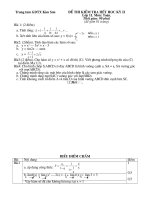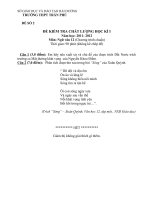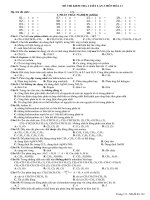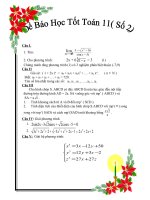câu hỏi đuôi lớp 11 hay, dễ hiểu
Bạn đang xem bản rút gọn của tài liệu. Xem và tải ngay bản đầy đủ của tài liệu tại đây (233.4 KB, 11 trang )
CÂU HỎI ĐUÔI
Cấu trúc:
Đối với động từ thường (ordinary verbs)
Câu giới thiệu khẳng định, phần hỏi đuôi phủ định.
S + V(s/es/ed/2)….., don’t/doesn’t/didn’t + S?
Câu giới thiệu phủ định, phần hỏi đuôi khẳng định
S + don’t/ doesn’t/didn’t + V….., do/does/did + S?
Hiện tại đơn với TO BE:
- he is handsome, is he? = Anh ấy
đẹp trai, đúng không?
– You are worry, aren’t you? = Bạn
đang lo lắng, phải không?
Hiện tại đơn động từ thường: mượn
- They like me, don’t they?
trợ động từ DO hoặc DOES tùy
– she loves you, doesn’t she?
theo chủ ngữ
Thì quá khứ đơn với động từ
thường: mượn trợ động từ DID, quá - He didn’t come here, did he?
khứ đơn với TO BE: WAS hoặc
– He was friendly, wasn't he?
WERE:
Thì hiện tại hoàn thành hoặc hiện
- They have left, haven’t they?
tại hoàn thành tiếp diễn: mượn trợ
– The rain has stopped, hasn’t they?
động từ HAVE hoặc HAS
Thì quá khứ hoàn thành hoặc quá
- He hadn’t met you before, had
khứ hoàn thành tiếp diễn: mượn trợ
he ?
động từ HAD:
Thì tương lai đơn
- It will rain, won’t it?
Hãy chú ý tới ý nghĩa của “yes và no” trong câu trả lời đối với câu
hỏi phủ định:
You’re not going out today, are you? (Hôm nay bạn không đi chơi
phải không?)
-
Yes. (=Yes, I am going out) Có. (=Có, tôi có đi chơi)
No. (=No, I am not going out) Không. (=Không, tôi không đi
chơi)
Đối với động từ đặc biệt (special):
Là các động từ khi chuyển sang câu phủ định ta thêm NOT vào
sau động từ, khi chuyển sang nghi vấn đưa chính động từ này lên trước
chủ ngữ.
Câu giới thiệu khẳng định, phần hỏi đuôi phủ định.
S + special verb….. , special verb + not + S?
Ex:
– You are a student, aren’t you?
She has just bought a new bicycle, hasn’t she?
Câu giới thiệu phủ định, phần hỏi đuôi khẳng định
S + special verb + not….., special verb + S?
Eg:
– You aren’t a student, are you?
She hasn’t bought a new bicycle, has she?
Đối với động từ khiếm khuyết
(modal verbs)
Câu giới thiệu khẳng định, phần hỏi đuôi phủ định.
S + modal verb…………., modal verb + not + S?
Eg:
– He can speak English, can’t he?
Lan will go to Hue next week, won’t she?
Câu giới thiệu phủ định, phần hỏi đuôi khẳng định
S + modal verb + not…………., modal verb + S?
Ex:
– He can’t speak English, can he?
Lan won’t go to Hue next week, will she?
Câu giới thiệu dùng “I am”, câu hỏi đuôi là “aren’t I”
Eg:
I am a student, aren’t I?
- Câu giới thiệu dùng Let’s, câu hỏi đuôi là “Shall we”
Eg:
Let’s go for a picnic, shall we?
- Chủ ngữ là những đại từ bất định “Everyone, someone, anyone, no
one, nobody…” câu hỏi đuôi là “they”
Eg:
Somebody wanted a drink, didn’t they?
Nobody phoned, did they?
- Chủ ngữ là “nothing” thì câu hỏi đuôi dùng “it”. Và Nothing là
chủ ngữ có nghĩa là mệnh đề giới thiệu đang ở dạng phủ định, câu
hỏi đuôi sẽ ở dạng khẳng định.
Eg: Nothing can happen, can it?
- Trong câu có các trạng từ phủ định và bán phủ định như: never,
seldom, hardly, scarely, little… thì câu đó được xem như là câu phủ
định – phần hỏi đuôi sẽ ở dạng khẳng định
Eg: He seldom drinks wine, does he?
- Câu đầu có It seems that + mệnh đề, lấy mệnh đề làm câu hỏi đuôi
Eg: It seems that you are right, aren’t you ?
– Chủ từ là mệnh đề danh từ, dùng “it” trong câu hỏi đuôi
Eg: What you have said is wrong, isn’t it ?
Why he killed himself seems a secret, doesn’t it ?
- Sau câu mệnh lệnh cách (Do…/Don’t do v.v… ), câu hỏi đuôi
thường là … will you?:
Eg: Open the door, will you?
Don’t be late, will you?
- Câu đầu là I WISH, dùng MAY trong câu hỏi đuôi
Eg: I wish to study English, may I ?
– Chủ từ là ONE, dùng you hoặc one trong câu hỏi đuôi
Eg: One can be one’s master, can’t you/one?
– Câu đầu có MUST, must có nhiều cách dùng cho nên tùy theo cách
dùng mà sẽ có câu hỏi đuôi khác nhau
Must chỉ sự cần thiết: => dùng needn’t
Eg: They must study hard, needn’t they?
Must chỉ sự cấm đoán: => dùng must Ex: You mustn’t come late, must
you ? Must chỉ sự dự đoán ở hiện tại: => dựa vào động từ theo sau
must Ex: He must be a very intelligent student, isn’t he? ( anh ta ắt hẳn
là 1 học sinh rất thông minh, phải không ?)
Must chỉ sự dự đoán ở quá khứ ( trong công thức must +have+ p.p) : =>
dùng [ ] là have/has Ex: You must have stolen my bike, haven’t you?
( bạn chắc hẵn là đã lấy cắp xe của tôi, phải không?)
- Câu cảm thán, lấy danh từ trong câu đổi thành đại từ, [ ] dùng is,
am, are
Eg: What a beautiful dress, isn’t it?
How intelligent you are, aren’t you?
- Câu đầu có I + các động từ sau: think, believe, suppose, figure,
assume, fancy, imagine, reckon, expect, seem, feel + mệnh đề phụ,
lấy mệnh đề phụ làm câu hỏi đuôi.
Eg: I think he will come here, won’t he?
I don’t believe Mary can do it, can she?
( lưu ý MĐ chính có not thì vẫn tính như ở MĐ phụ)
Cùng mẫu này nhưng nếu chủ từ không phải là I thì lại dùng mệnh đề
đầu làm câu hỏi đuôi.
Eg: She thinks he will come, doesn’t she?
- USED TO: từng (diễn tả thói quen, hành động thường lập đi lập lại
trong quá khứ).
Trường hợp này, ta cứ việc xem USED TO là một động từ chia ở thì quá
khứ. Do đó, câu hỏi đuôi tương ứng chỉ cần mượn trợ động từ DID
Eg: She used to live here, didn’t she?
– Had better: “had better” thường được viết ngắn gọn thành ‘D
BETTER, nên dễ khiến ta lúng túng khi phải lập câu hỏi đuôi tương ứng.
Khi thấy ‘D BETTER, chỉ cần mượn trợ động từ HAD để lập câu hỏi
đuôi.
Eg: He’d better stay, hadn’t he?
– WOULD RATHER: Would rather thường được viết gọn là ‘D
RATHER nên cũng dễ gây lúng túng cho bạn. Chỉ cần mượn trợ động từ
WOULD cho trường hợp này để lập câu hỏi đuôi.
Eg: You’d rather go, wouldn’t you?
1.
2.
3.
4.
5.
6.
7.
He sometimes reads the newspaper, ..................?
You are Indian, ..................?
They had a nice weekend, ..................?
Peggy didn't use the pencil, ..................?
Mary has answered the teacher's question, ..................?
The boy is from Turkey, ..................?
Sue wasn't listening, ..................?
Andrew isn't sleeping, ..................?
9. Tom and Maria will arrive at Heathrow, ..................?
10. She has a brother, ..................?
11. She is collecting stickers, .................?
12. We often watch TV in the afternoon, .................?
13. You have cleaned your bike, .................?
14. John and Max don't like maths, .................?
15. Peter played handball yesterday, .................?
16. They are going home from school, .................?
17. Mary didn't do her homework last Monday, .................?
18. He could have bought a new car, .................?
19. Kevin will come tonight, .................?
20. I'm clever, .................?
8.
He's been to Texas, ..................?
22.
Dogs like meat, ..................?
23.
There are some apples left, ..................?
24.
I'm late, ..................?
25.
Let's go, ..................?
26.
Don't smoke, ..................?
27.
He does sing in the bathroom, ..................?
28.
He'll never know, ..................?
29.
I think he's from India, ..................?
30.
Lovely day today, ..................?
ĐÁP ÁN
1.
doesn't he?
11.
isn't she?
2.
aren't you?
12.
don't we?
3.
didn't they?
13.
haven't you?
4.
did she?
14.
do they?
5.
hasn't she?
15.
didn't he?
6.
isn't he?
16.
aren't they?
7.
was she?
17.
Did she
8.
is he?
18.
couldn't he?
9.
won't they?
19.
won't he?
10. doesn't she?
20.
aren't I?
21.
21.
22.
23.
24.
25.
26.
27.
28.
29.
30.
hasn't he?
don't they?
aren't there?
aren't I?
shall we?
will you?
doesn't he?
will he?
isn't he?
isn't it?
Tổng hợp bài tập câu hỏi đuôi có đáp án
EXERCISE I: Add tag questions to the following.
1. Lan enjoys watching TV after dinner, …………?
2. Tam didn’t go to school yesterday, ……..?
3. They’ll buy a new computer, ………?
4. She can drink lots of tomato juice everyday, ………….?
5. She may not come to class today, ………….?
6. We should follow the traffic rules strictly, ………….?
7. Your mother has read these fairy tales for you many times, .
………….?
8. He seldom visits you, ………….?
9. You’ve never been in Italy, . ………….?
10. That’s Bob, ………….?
11. No-one died in the accident, ………….?
12. I’m supposed to be here, ………….?
13. Nothing is wrong………….?
14. Nobody called the phone, ………….?
15. Everything is okay, ………….?
16. Everyone took a rest, ………….?
17. Going swimming in the summer is never boring, ………….?
18. Let’s dance together, ………….?
19. Don’t talk in class, ………….?
20. Sit down, ………….?
21. This picture is yours, ………….?
22. Hoa never comes to school late, ………….?
23. You took some photos on the beach, . ………….?
24. He hardly ever makes a mistake, ………….?
EXERCISE II: Add tag questions to the following.
1. They want to come,………………….?
2. Elizabeth is a dentist, ……………….. ?
3. They won’t be here, …………………?
4. That is your umbrella, ………………….?
5. There aren’t many people here yet, …………….. ?
6. He has a bicycle,……………………?
7. Peter would like to come with us to the party, ……………………..?
8. Those aren’t Fred’s books, ………?
9. You have never been to Paris,…………?
10. Something is wrong with Jane today, ………… ?
11. Everyone can learn how to swim, ……………… ?
12. Nobody cheated in the exam, ………………….. ?
13. Nothing went wrong while I was gone, ………… ?
14. I am invited, ………………….?
15. This bridge is not very safe,……………..?
16. These sausages are delicious, …………….?
17. You haven’t lived here long, …………?
18. The weather forecast wasn’t very good, ……………. ?
19. He’d better come to see me, .............. ?
20. You need to stay longer, ................................?
EXERCISE III: Add tag questions to the following.
1. You don't know where Ann is, …………..?
2. They haven't seen this film, ……………..?
3. You wouldn't tell anyone about it, ……………?
4. He'd never seen you before,……………….?
5. Let's go out for a walk, …………………..?
6. This is your book,………………?
7. I am supposed to be here, ………….?
8. There is a meeting tonight, ……………………?
9. Tom won't be here late, ………………………………?
10. You 're tired,……………………….?
11. You haven't lived here long, ………………?
12. You came in a sports car, ………………………?
13. These cakes look good, ………………………?
14. You can speak German, …………………..?
15. You couldn't do me a favor, ……………….?
Đáp án bài tập câu hỏi đuôi
EXERCISE I:
2. did
3. won't
1. doesn't she
he/she
they
7. hasn't
6. shouldn't we
8. Does he
she
11. did they
16. didn't they
21. isn't it
EXERCISE
II:
1. don't they
6. doesn't he
11. can't they
16. aren't they
4. can't she 5. may she
9. have
you
14. did
12. aren't I 13. is it
they
19. Will
17. is't it
18. shall we
you
22. Does
23. didn't
24. does he
she
you
2. isn't she 3. will the
7.
wouldn't
he
12. did
they
17. have
you
10. isn't it?
15. isn't it
20. will
you
4. isn't it
5. are there
8. are they
9. have
you
10. isn't it
13. did it
14. aren't I 15. is it
18. was it
19. hadn't
he
20. don't
you
4. Had he
5. shall we
EXERCISE
III:
1. do you
2. have
they
3. would
you
6. isn't it
7. aren't I
8. isn't there 9. will he
11. have you
12. didn’t
you
13. don't
they
14. can't
you
10. aren't
you
15. could
you









